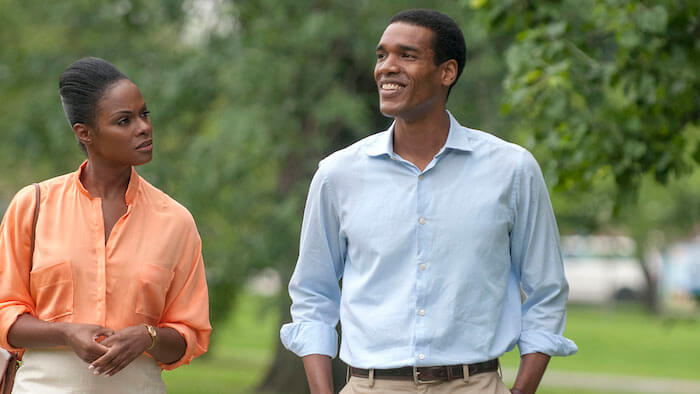Barack and Michelle’s First Date: Southside With You

Southside with You
Directed by Richard Tanne
Opens August 26
What a difference two terms make: Around this point in George W. Bush’s administration, Oliver Stone was putting the final touches on W., a lacerating if also somewhat empathetic portrait of our then-sitting president as an unloved alcoholic dope with a chip on his shoulder. In the final months of his successor’s presidency, Southside with You gives Barack and Michelle Obama the Before Sunrise treatment. The movie takes some anecdotal information and uses it to imagine the summer 1989 first date between the future president (Parker Sawyers) and Michelle Robinson (Tika Sumpter), then coworkers at a Chicago law firm.
Actually, it’s not a date—at least that’s what Michelle firmly insists at the outset, believing (at least outwardly) that the pair will simply attend the meeting of a community group that Barack used to help run. He shows up late, cigarettes and crummy car and all, but not for the meeting, which is turns out is hours away; he suggests they take in a museum exhibit and maybe grab a bite to eat beforehand. Michelle nearly leaves.
But she agrees to stick around for a non-date, and they wind up talking: about Good Times, basketball, “We Real Cool,” Stevie Wonder albums, and Do the Right Thing, among other topics. She calls him “buster” and he keeps his cool—mostly. The actors affect subtly imitative vocal inflections—Sumpter’s Michelle sounds a little nerdier than the version we know from her recent powerhouse DNC speech—but mostly avoid cartoonish impressions. Once in a while, the dialogue gets a little speechy, but then, the Before series sometimes goes that way, too, and without characters who will later become known for their public eloquence.
It’s a little surprising and, yeah, a little disappointing, that writer-director Richard Tanne is a white dude from Jersey, though he produced the film with Sumpter, a TV star and, in movies, player of bit parts and girlfriends. It would have been nice to see Chicago’s South Side through the eyes of a native and/or a black person, but working with his charming leads, Tanne does show off the Obamas through the eyes of a clear admirer. Yet this isn’t pure hero worship, either; it’s the work of a filmmaker enchanted by his subjects as a couple, not as conduits of history.
Sawyers and Sumpter’s faces don’t share onscreen space in their first scene together, and even in many subsequent scenes, Tanne often keeps one or the other either out of frame or out of focus. He also keeps many of their two-shots at a distance, adding a romantic elusiveness to the sense of inevitability that comes from watching a sorta-rom-com about two people we know wind up married with children. The visual restraint balances out the way the movie sometimes goes on the nose with its foreshadowing: Obama talking about how it’s “not easy to get things done,” and Michelle mentioning that he “sounded a little professorial” during that actual community meeting, where he gives a speech that serves to both show off his skills to Michelle and to make the movie look, however briefly, more like a traditional presidential biopic.
The movie backs away from this grandiosity, staying within the frame of Barack and Michelle spending the better part of a single day together. It’s rare to see a presidential portrait (however fictionalized) with this degree of intimacy—and, for that matter, rare to see a First Lady given such an equal voice. There may be a touch of shamelessness in the way the movie plays on any audience affection for the Obamas, but in the end, it’s just the inverse of the traditional rom-com strategy of casting charismatic movie stars to play unknown characters: Sawyers and Sumpter are relative unknowns cast as well-known figures of charisma. If this is American mythmaking, it’s an uncommonly lovely version of it.
You might also like 



















